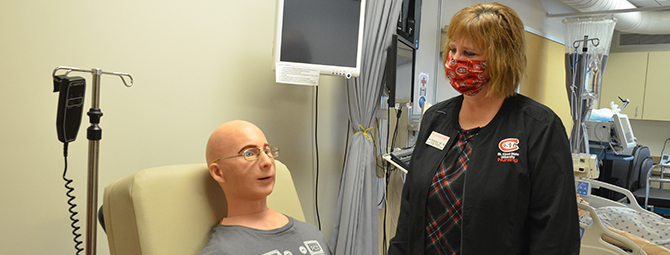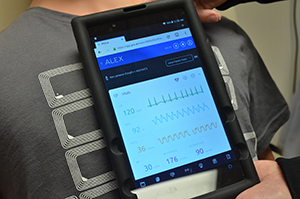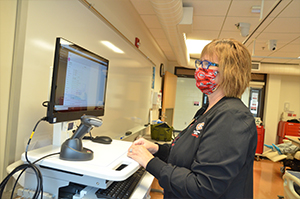
After greeting her patient, Nursing Lab Coordinator Jan Richardson steps up to the patient and asks: “How much do you exercise?”
He responds: “Once or twice a week I try to go for a long walk, but recently it’s hard.”
Richardson responds with concern and care as she makes notes in her chart.
Richardson’s patient isn’t alive, but he is learning. Alex is a full-sized patient communication simulator, a PCS Alex, that students can interact with to practice communicating with patients in a clinical setting.
Alex works on artificial intelligence and speech recognition. The more the nursing faculty and students speak to him the more language he learns. Alex is part of an ongoing improvement to make the nursing lab as realistic as possible.
Alex PCS can also be programmed and dressed to be male or female, old or young. Faculty can program scenarios and outcomes.

In a recent training demonstration a faculty member was in the room having a conversation about having protein shakes for breakfast. The next day in a simulation, a student asked what he had for breakfast and he answered that he’d had a protein shake. He just learned that, Richardson said.
Another time a student asked if he took any supplements, Alex answered “no I leave that to the younger generations,” and he laughed.
“It’s just amazing how he can learn those types of things,” Richardson said. His ability to learn also makes Alex more useful for learning communications because he can respond to unanticipated questions students ask and he can get flummoxed when students ask multiple questions at once or ask for clarification.
“That is reality,” Richardson said. “If I ask two or three questions and the patient says ‘yes’, which were they saying yes to? This experience forces students to be clear, concise and really get accurate answers.”
Alex can speak English, French and Spanish, so the students can practice trying to communicate with someone who speaks a different language. The department is exploring the possibility of teaching him Somali, to better prepare students to work with the Somali community in Central Minnesota.
The department got Alex in summer, and students have been using him independently in lab scenarios that are recorded and reviewed by their faculty. Students can also practice vital signs and assessments with Alex and hear sounds coming from his lungs and bowels.

The lab also installed new Sim Electronic Medical Records software and medication dispensing carts this summer that allows students to view patient records in person or remotely and distributes bar coded medications. That is the type of technology being used in health care settings, and St. Cloud State’s lab is preparing students for that environment, Richardson said.
The SimEMR and carts were made possible due to a leveraged equipment grant with matching funds from the Maciej donation.
Jim’73 and Ann Marie Maciej donated $1 million to the Nursing Program in 2018 to fund new Nursing Simulation Labs and related technology infrastructure and on-going support for technology in the program.
“The real goal with both of these is for our students to provide safe, competent care,” she said. “That’s really what we want our students to be able to do and we strive to be as real as possible to prepare them for practice.”
